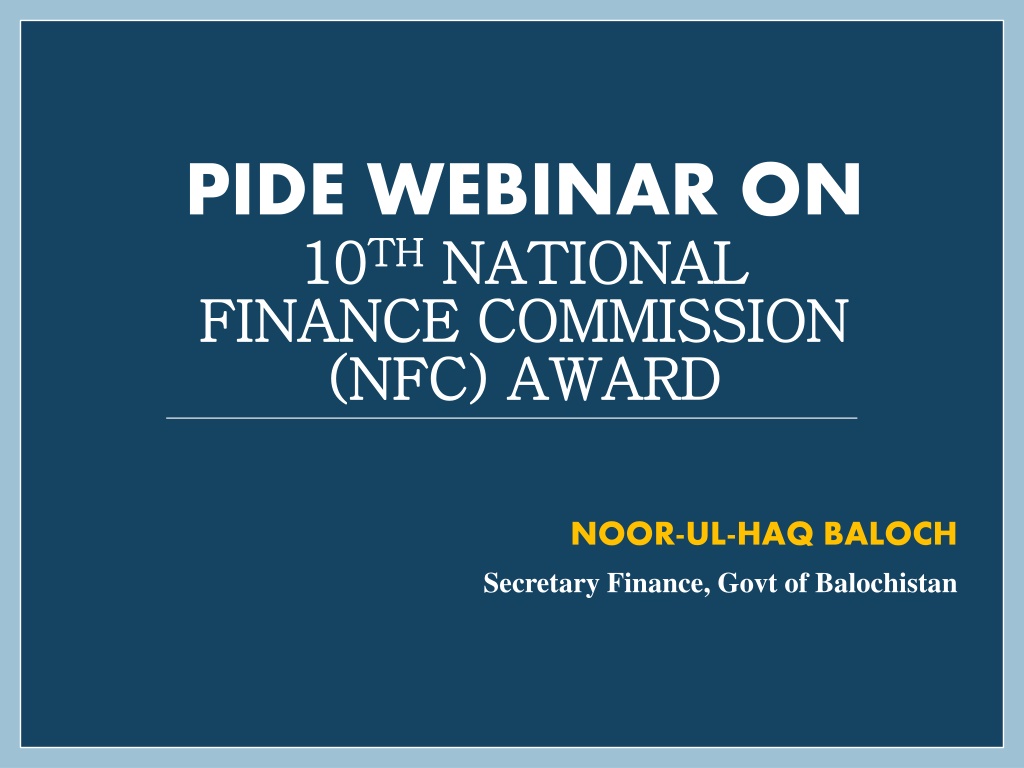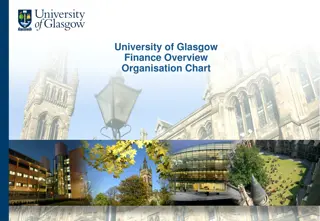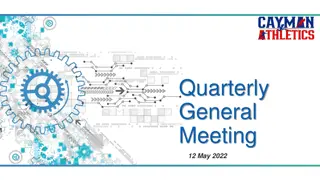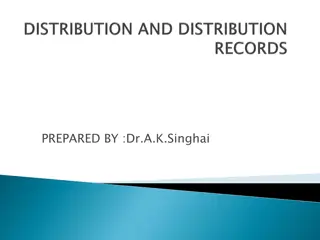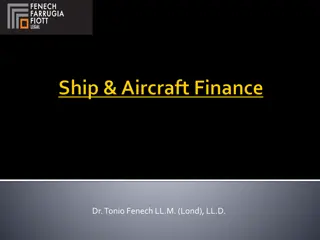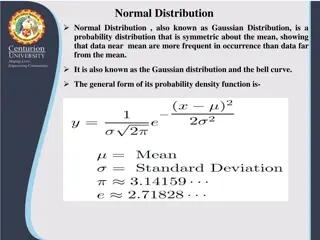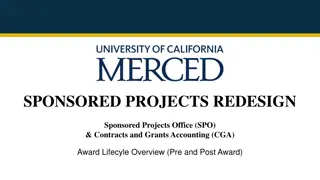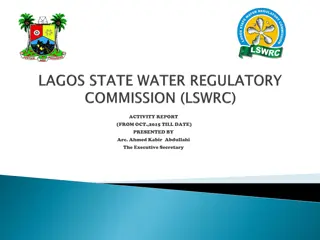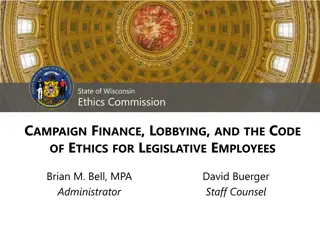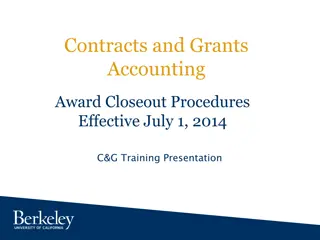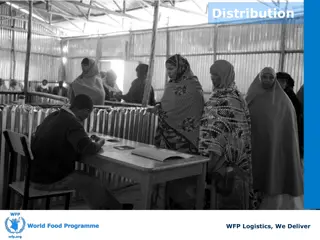National Finance Commission Award Distribution
The National Finance Commission (NFC) award distribution process in Pakistan, including historical background, constitutional provisions, commission composition, and the impact on fiscal discipline. Learn about the criteria for distributing financial resources among provinces and the efforts to improve fiscal management.
Download Presentation

Please find below an Image/Link to download the presentation.
The content on the website is provided AS IS for your information and personal use only. It may not be sold, licensed, or shared on other websites without obtaining consent from the author.If you encounter any issues during the download, it is possible that the publisher has removed the file from their server.
You are allowed to download the files provided on this website for personal or commercial use, subject to the condition that they are used lawfully. All files are the property of their respective owners.
The content on the website is provided AS IS for your information and personal use only. It may not be sold, licensed, or shared on other websites without obtaining consent from the author.
E N D
Presentation Transcript
PIDE WEBINAR ON 10 10TH NATIONAL FINANCE COMMISSION FINANCE COMMISSION (NFC) AWARD (NFC) AWARD THNATIONAL NOOR-UL-HAQ BALOCH Secretary Finance, Govt of Balochistan
Contents: Contents: Historical arrangement and Introduction of NFC Constitutional Provision & Composition of NFC NFC Representation from Balochistan Pre & Post 7thNFC Award distribution criteria and its features Contributing Indicators from each province Calculating Criterion of 7thNFC Distribution Divisible pool of taxes and its historical Inter-Provincial-Share Post 7th NFC Impact on GoB s Fiscal position Efforts for improving fiscal discipline Proposed initiatives for 10thNFC Finance Department, GoB 2
What is NFC What is NFC The National Finance Commission (NFC) award, is the distribution of Financial Resources between Federation and Provinces and among the Provinces of Pakistan by the Federal Govt on Annual Basis. Certain type of Taxes collected in each province are pooled, then re-distributed (from Federation to provinces) according to the NFC formula. Finance Department, GoB 3
Constitutional Provision Constitutional Provision NFC is constituted under article 160(1) of the Constitution of Islamic Republic of Pakistan and proposed to be held at the intervals of five (05) years. ARTICLE 160(1) of 1973 Constitution: Within six months of the commencing day and thereafter at intervals not exceeding five (consecutive) years, the President shall constitute a National Finance Commission consisting of the Minister of Finance of the Federal Government, the Ministers of Finance of the Provincial Governments, and such other persons as may be appointed by the President after consultation with the Governors of the Provinces Finance Department, GoB 4
Commission Composition Commission Composition Federal Finance Minister (CHAIRMAN) Provincial Finance Ministers (MEMBER) Non-Statutory Members (Appointed by President) Federal Secretary Finance (Official Expert) Finance Department, GoB 5
Charter of NFC Charter of NFC Distribution of the net proceeds of the taxes between the Federation and the Provinces Making of grants-in-aid by the Federal Government to the Provincial Governments Exercising borrowing powers by the Federal Government and the Provincial Governments Any other matter relating to finance referred to the Commission by the President Finance Department, GoB 6
NFC Distribution Matrix NFC Distribution Matrix (1/2) (1/2) Horizontal Distribution Award Revenue Sharing Criteria Vertical Distribution Provinces Punjab 60.25% Sindh 22.50% Federal 20% Provinces 80% 1st NFC 1974 Population (100%) KPK 13.39% Balochistan 3.86% Punjab 57.97% Sindh 23.34% Federal 20% Provinces 80% 2nd NFC 1797 Population (100%) KPK 13.39% Balochistan 5.30% Punjab 57.97% Sindh 23.34% Federal 20% Provinces 80% 3rd NFC 1985 Population (100%) KPK 13.39% Balochistan 5.30% Punjab 57.88% Sindh 23.28% 4th NFC Award 1985 Federal 20% Provinces 80% Population (100%) KPK 13.50% Balochistan 5.30% Finance Department, GoB 7
NFC Distribution Matrix NFC Distribution Matrix (2/2) (2/2) Horizontal Distribution Award Revenue Sharing Criteria Vertical Distribution Provinces Punjab 57.88% Sindh 23.28% 5th NFC Award 1996 Federal 62.5% Provinces 37.5% Population (100%) KPK 13.50% Balochistan 5.30% Punjab 57.97% Sindh 23.34% 6th NFC Award 2000 Federal 62.5% Provinces 37.5% Population (100%) KPK 13.39% Balochistan 5.30% Punjab 51.74% Population (82.6%) Backwardness (10.3%) Revenue (5%) IPD (2.7%) Sindh 24.55% 7th NFC Award 2009 onward Federal 42.5% Provinces 57.5% KPK 14.62% Balochistan 9.09% Finance Department, GoB 8
NFC Representation by Balochistan NFC Representation by Balochistan S.No. NFC & Period Represented Names 1. 7th NFC up to 2010 Dr. Gulfraz Ahmed Mr. Shaikh Jaffar Khan Mandokhail 2. 8th NFC, 2010 to 2014 8th NFC (2015) & 9thNFC (2015 to Nov 2018) 9thNFC (Nov 2018 to March 2020 ) 3. Dr. Kaiser Bangali 4. Mr. Mehfooz Ali Khan 5. 10thNFC (2020 April 2020) Mr. Javed Jabbar Finance Department, GoB 9
Distribution Criteria: Distribution Criteria: INDICATORS WEIGHT Population 82.0 % Poverty / Backwardness 10.3 % Revenue Collection / Generation 5.0 % Inverse Population Density (IPD) 2.7 % Finance Department, GoB 10
Revenue Sharing Formula of the Provinces in Revenue Sharing Formula of the Provinces in context to Distribution Criteria context to Distribution Criteria Contribution from Provinces / Revenue Sharing Formula Indicators Weight Punjab Sindh KPK Balochistan Population Share 82.0% 57.36 23.71 13.82 5.11 Punjab Poverty / Backwardness 10.3% KPK 23.16 23.41 27.82 25.61 Revenue Generation 5.0% Sindh 44.0 50.0 5.0 1.0 Inverse Population Density 2.7% Balochistan 4.34 7.21 6.54 81.92 Total Share 100% 51.74 24.55 14.62 9.09 Finance Department, GoB 11
District wise Poverty Rate of Balochistan Province 68% 66% 65%64%65% 64%64% 64% 61% 61% 60% 57%59%58% 59% 58% 57% 54% 54% 53%51%50% 53% 51% 49% 49% 47% 47% 44%46% 46% 44% 41% LORALAI HARNAI KALAT QUETTA ZHOB ZIARAT AWARAN DUKI* KECH KHARAN KOHLU SIBI CHAGAI KACHHI MUSA KHAIL WASHUK* KILLA ABDULLAH LASBELA GWADAR KHUZDAR MASTUNG SOHBATPUR* BARKHAN PISHIN DERA BUGTI NASIRABAD SHIRANI JAFFARABAD JHAL MAGSI NUSHKI PANJGUR Shaheed Sikandarabad KILLA SAIFULLAH Finance Department, GoB 12
District wise Revenue Sharing Criteria of NFC (Revenue Collection / Generation 5.0%) QUETTA, 69.7% SHIRANI, 0.1% SIBI, 0.5% Shaheed Sikandarabad, 0.1% SOHBATPUR* , 0.1% WASHUK*, 0.1% ZHOB, 0.2% LASBELA, 14.7% ZIARAT, 0.1% PISHIN, 1.6% PANJGUR, 0.2% BARKHAN, 0.2% DERA BUGTI, 0.2% AWARAN, 0.2% CHAGAI, 0.4% NUSHKI, 0.2% NASIRABAD, 3.2% HARNAI, 0.1% JAFFARABAD, 0.9% JHAL MAGSI, 0.4% KACHHI, 0.2% KALAT, 0.2% KECH, 1.4% DUKI*, 0.3% MUSA KHAIL, 0.1% MASTUNG, 0.2% GWADAR, 0.9% KOHLU, 0.2% LORALAI, 0.6% KILLA SAIFULLAH, 0.2% KHARAN, 0.2% KILLA ABDULLAH, 1.3% KHUZDAR, 1.0% Finance Department, GoB 13
Provincial Share Provincial Share %Age share of Provinces 80% 80% Interim Award 80% 37.5% Interim Award 55% 56% 57.5% %Age share of Federation 20% 20% Interim Award 20% 62.5% Interim Award 45% 44% 42.5% Award Year 1974 1979 1985 1990 1996 2000 2006 2009 2010 onwards Source: National Finance Commission Awards in Pakistan: A Historical Perspective, PIDE working papers 2007:33 Finance Department, GoB 14
History of Composition of Federal History of Composition of Federal Divisible Pool Divisible Pool Award Federal-Provincial Share (%) Taxes (in Divisible Pool) Income & Corporate Tax Sales Tax Export duties 20 : 80 1st 1974 20 : 80 4th 1991 As above + CED 63 : 37 6th 1997 As above + Import Duties 52.5 : 47.5 Presidential Order 2006 As above 42.5 : 57.5 7th 2010 As above Finance Department, GoB 15
Comparative Analysis (1/2) Comparative Analysis (1/2) Share Federal Provinces Pre-7th NFC Award 52.7% 47.3% Post 7th NFC Award 42.5% 57.5% Effect REDUCED INCREASED PROVINCES FEDERAL 47.3% to 57.5 % 42.7% to 42.5 % Finance Department, GoB 16
Comparative Analysis (2/2) Comparative Analysis (2/2) Provinces Punjab Sindh KPK Balochistan Pre-7th NFC Award 53.10 % 24.94 % 14.88% 5.3% Post 7th NFC Award 51.70 % 24.55 % 14.62 % 9.09% PUNJAB 1.26% Net Effect: 0.39% SINDH 0.26% KPK 3.79% BALOCHISTAN Finance Department, GoB 17
Composition of Federal Divisible Composition of Federal Divisible Pool (1/2) Pool (1/2) Tax Head Share in all taxes (%) 39.9 % 38.9 26.7 12.2 1.0 60.1 % 11.8 42.0 6.3 100 % Direct Taxes Income Tax (IT) Withholding Tax (WHT) IT net of WHT Other Direct Taxes Indirect Taxes Customs Duty (CD) General Sales Tax (GST) Federal Excise Duty (FED) FEDERAL DIVISIBLE POOL Finance Department, GoB 18
Composition of Federal Divisible Composition of Federal Divisible Pool (2/2) Pool (2/2) Following taxes are collected and pooled for re- distribution among provinces: Income Tax Capital Value Tax Sales Tax (Excl GST on Services) Federal Excise (Excl Excise Duty on Natural Gas) Custom Duty (Excl Export Development Surcharges) Any other TAX levied by the Federal Govt Finance Department, GoB 19
Distribution Pattern Distribution Pattern There are 2 types of distribution made out of the NFC Platform: Vertical Distribution Horizontal Distribution Collection of Divisible Pool Taxes from all sources and determine Net proceeds to be shared toward Provinces & Federation Distributing the Due- Share of the Provinces from the Net proceeds derived through Vertical Distribution Step-1 Step-2 Finance Department, GoB 20
Vertical Distribution (Step Vertical Distribution (Step- -1) 1) (minus) 1% for War on Terror for KPK xxx (minus) Collection Charges (1%) Net Balance Net Divisible Pool 57.5% Share of Province 42.5% Share of Federal FBR Receipts Divisible Pool Taxes Divisible Pool Taxes: xxx xxx xxx xxx xxx xxx Income Tax Definition: Wealth Tax Collection of Divisible Pool Taxes from all sources and determine Net proceeds to be shared toward Provinces & Federation Capital Value Tax Sales Tax (Excl GST) Fed Excise (Excl ED on NG) Customs Duty (Calculation from left to right) Finance Department, GoB 21
Horizontal Distribution (Step Horizontal Distribution (Step- -2) 2) Punjab Sindh KPK Balochistan Total 51.74% 24.55% 14.62% 9.09% 100% Divisible Pool Taxes: xxx xxx xxx xxx xxx Income Tax Definition: Wealth Tax Capital Value Tax Distributing the Due-Share of the Provinces from the Net proceeds derived through Vertical Distribution Sales Tax (Excl GST) Fed Excise (Excl ED on NG) Customs Duty Finance Department, GoB 22
STRENGTHENING THE STRENGTHENING THE FEDERATION FEDERATION
Strengthening the Federation (1/2) Strengthening the Federation (1/2) There is a view that the 7th NFC Award transferred excessive resources to the provinces, creating a fiscal imbalance and shrinking federal fiscal space. Concern arises also from the fact that the road to reducing the 7th NFC specified provincial (vertical) share has been blocked by a constitutional provision. In this context, a demand has been placed for the NFC to pre-allocate 7% of the Federal Divisible Pool for the federal government: 3% for meeting security needs and 4% for meeting development needs of federal territories: Azad Kashmir, Gilgit-Baltistan and FATA. The demand is based on a precedent created by the 7th NFC in pre- allocating one percent of the Divisible Pool for Khyber-Pakhtunkhwa (for War on Terror). Finance Department, GoB 24
Strengthening the Federation (2/2) Strengthening the Federation (2/2) The other view is that federal interpretation of the fiscal impact of the 7th NFC is flawed and its demands untenable. It is held that federal fiscal gap has been created on account of its failure to: (1) raise the Tax-GDP ratio, as stipulated in the 7th NFC Award and (2) to follow up on the 18th Constitutional Amendment, which divested the federation of a wide range of functions and which, had it been carried out accordingly, would have served to reduce federal expenditures. Finance Department, GoB 25
POST 7 POST 7TH ON BALOCHISTAN ON BALOCHISTAN TH NFC IMPACT NFC IMPACT
Impact of 7th NFC Award on Share of Impact of 7th NFC Award on Share of Balochistan Balochistan Share of Balochistan from the Divisible Pool enhanced from 5% to 9.09%. Balochistan province share was protected against annual budgetary projections during the Award period. The same has been continued during the period of extension of the Award. Shortfall (if any) is met by the Federal Government Balochistan s demand for arrears of GDS accepted. Federation agreed to provide Rs.120 billion to GoB over a period of 12 years @ Rs.10.00 billion each year. Balochistan got some breathing fiscal space and allocated more funds for investment on social sectors and infrastructure development in the province. Finance Department, GoB 27
NFC Impact on Divisible Pool NFC Impact on Divisible Pool (Over the last 15 years) (Over the last 15 years) 281,229.72 350,000 250% An obvious rise in the share of Balochistan after 7th NFC award 300,000 224,115.98 197% 200% 202,691.37 189,025.67 250,000 155,992.83 141,212.84 150% 200,000 123,274.18 111,406.30 93,225.26 150,000 83,000.00 100% 100,000 27,933.98 22% 22,939.24 16,400.85 13,718.46 12,088.35 40% 50% 25% 50,000 21% 21% 20% 20% 15%10% 13% 12% 11% 11% 7% 0 0% Divisible Pool Annual Growth Finance Department, GoB 28
NFC Impact on Straight Transfer NFC Impact on Straight Transfer (Over the last 15 years) (Over the last 15 years) 21,762.52 25,000 140% 18,013.04 120% 17,122.75 100% 20,000 13,753.68 13,479.77 13,404.82 80% 12,949.25 12,834.90 12,640.59 60% 10,783.33 10,228.60 15,000 9,655.97 9,445.05 40% 8,087.67 20% 6,251.99 10,000 0% -20% 5,000 -40% -60% 0 -80% Straight Transfer Annual Growth Finance Department, GoB 29
NFC Impact on Grants / GDS Arrears NFC Impact on Grants / GDS Arrears (Over the last 15 years) (Over the last 15 years) 16,975.50 18,000 60% 13,683.15 50% 16,000 12,429.98 12,000.00 12,000.00 12,000.00 11,649.91 11,515.91 40% 14,000 10,000.00 10,000.00 10,000.00 10,000.00 10,000.00 30% 12,000 8,330.00 20% 7,784.77 10,000 10% 8,000 0% 6,000 -10% 4,000 -20% 2,000 -30% 0 -40% GDS Arrears Growth Finance Department, GoB 30
Fiscal Impact of Provincial Own Resources Fiscal Impact of Provincial Own Resources (Over the last 10 years) (Over the last 10 years) 25,000.00 120% 21,152.00 100% 20,000.00 15,928.39 80% 14,143.55 60% 12,366.16 15,000.00 11,160.48 40% 9,578.76 20% 10,000.00 5,717.30 5,301.01 5,197.88 0% 4,938.69 -20% 5,000.00 -40% 0.00 -60% 2010-11 2011-12 2012-13 2013-14 2014-15 2015-16 2016-17 2017-18 2018-19 2019-20 Net Receipt (PROV) Annual Growth % Finance Department, GoB 31
Fiscal Impact of Provincial Own Resources Fiscal Impact of Provincial Own Resources TAX TAX- -REVENUE REVENUE (Over the last 10 years) (Over the last 10 years) 14,756.00 16,000.00 140% 120% 14,000.00 10,226.01 100% 12,000.00 9,430.74 80% 10,000.00 6,754.10 60% 8,000.00 40% 3,898.16 6,000.00 20% 1,749.88 4,000.00 1,336.57 1,238.25 0% 1,107.29 1,032.12 2,000.00 -20% 0.00 -40% 2010-11 2011-12 2012-13 2013-14 2014-15 2015-16 2016-17 2017-18 2018-19 2019-20 Tax Revenue Growth Finance Department, GoB 32
Fiscal Impact of Provincial Own Resources Fiscal Impact of Provincial Own Resources NON NON- -TAX REVENUE TAX REVENUE (Over the last 10 years) (Over the last 10 years) 8,471.47 9,000.00 120% 7,262.32 100% 8,000.00 6,396.00 80% 7,000.00 5,702.38 5,612.06 60% 6,000.00 4,712.80 4,685.17 40% 3,861.31 5,000.00 3,700.43 3,551.13 20% 4,000.00 0% 3,000.00 -20% 2,000.00 -40% 1,000.00 -60% 0.00 -80% 2010-11 2011-12 2012-13 2013-14 2014-15 2015-16 2016-17 2017-18 2018-19 2019-20 Non Tax Revenue Finance Department, GoB Growth 33
Trend of Overall Expenditures Budget Trend of Overall Expenditure s Budget (Current + Development) (Current + Development) 450 400 419.922 350 328.502 300 313.115 289.356 250 243.528 200 215.713 198.395 179.931 150 164.574 152.017 100 74.677 50 0 2009-10 2010-11 2011-12 2012-13 2013-14 2014-15 2015-16 2016-17 2017-18 2018-19 2019-20 Finance Department, GoB 34
Trend of GoBs Current (Non Trend of GoB s Current (Non- -Dev) Expenditure Burden Dev) Expenditure Burden 350 300 293.579 250 258.874 242.491 200 218.174 189.023 150 164.971 154.482 144.112 133.206 125.263 100 50 55.546 0 2009-10 2010-11 2011-12 2012-13 2013-14 2014-15 2015-16 2016-17 2017-18 2018-19 2019-20 Finance Department, GoB 35
Trend of GoBs Development Expenditure Burden Trend of GoB s Development Expenditure Burden 120 108.13 100 80 60 64.544 61.738 50.481 40 41.691 35.995 33.851 32.347 31.916 26.458 20 13.614 0 2009-10 2010-11 2011-12 2012-13 2013-14 2014-15 2015-16 2016-17 2017-18 2018-19 2019-20 Finance Department, GoB 36
Expenditure Pattern of Priority Sectors Expenditure Pattern of Priority Sectors Financial Year Water (Irrigation)Agriculture CommunicationLaw & Education Health Order 2009-10 2010-11 2011-12 2012-13 2013-14 2014-15 2015-16 2016-17 2017-18 2018-19 2019-20 3.449 18.968 22.723 24.258 35.006 36.56 48.113 46.207 48.327 56.541 62.43 1.869 7.579 8.479 10.409 13.426 17.285 16.672 21.032 25.164 23.607 22.382 3.392 4.95 6.869 4.52 3.754 4.949 6.057 7.179 8.875 9.077 9.098 1.893 3.958 4.486 5.274 6.507 8.397 10.606 11.493 11.591 12.525 13.893 8.014 16.896 17.528 18.353 17.912 18.167 13.416 23.169 22.622 29.147 18.683 7.4 8.7 12 18.2 20.7 23.4 26.7 29.4 32.7 36.1 37.306 Finance Department, GoB 37
Expenditure Pattern of Priority Sector Expenditure Pattern of Priority Sector - - EDUCATION 62.43 56.541 48.327 48.113 46.207 36.56 35.006 24.258 22.723 18.968 3.449 2009-10 2010-11 2011-12 2012-13 2013-14 2014-15 2015-16 2016-17 2017-18 2018-19 2019-20 Finance Department, GoB 38
Expenditure Pattern of Priority Sector Expenditure Pattern of Priority Sector - - HEALTH 25.164 23.607 22.382 21.032 17.285 16.672 13.426 10.409 8.479 7.579 1.869 2009-10 2010-11 2011-12 2012-13 2013-14 2014-15 2015-16 2016-17 2017-18 2018-19 2019-20 Finance Department, GoB 39
Expenditure Pattern of Priority Sector Expenditure Pattern of Priority Sector - - WATER 9.098 9.077 8.875 7.179 6.869 6.057 4.949 4.95 4.52 3.754 3.392 2009-10 2010-11 2011-12 2012-13 2013-14 2014-15 2015-16 2016-17 2017-18 2018-19 2019-20 Finance Department, GoB 40
Expenditure Pattern of Priority Sector Expenditure Pattern of Priority Sector - - AGRICULTURE 13.893 12.525 11.591 11.493 10.606 8.397 6.507 5.274 4.486 3.958 1.893 2009-10 2010-11 2011-12 2012-13 2013-14 2014-15 2015-16 2016-17 2017-18 2018-19 2019-20 Finance Department, GoB 41
EXTERNAL AND EXTERNAL AND INTERNAL DEBT INTERNAL DEBT BURDEN BURDEN
INTERNAL DEBT INTERNAL DEBT GoB has as such no Internal or Intra-Provincial Debt at the present. But the burden of GPF is treated as internal debt and payable by the Provincial Govt to its employees as an on-going liability. EXTERNAL DEBT EXTERNAL DEBT GoB, at the present is surrounded with the Foreign Exchange Loans or the External Debt with overall portfolio of more than 55 billion rupees outstanding against 67 foreign loans from World CIDA CIDA and and German German Bank Bank as of today. World Bank, Bank, ADB, ADB, IFAD, IFAD, Apart of the 67 loans being repaid, GoB owe (4) four fresh loans in disbursement phase, lent by World Bank, ADB and IFAD. Finance Department, GoB 43
Proportion of External Debt outstanding with Govt of Proportion of External Debt outstanding with Govt of Balochistan w.r.to Foreign Currency Balochistan w.r.to Foreign Currency US Dollar Japaneses Yen $ JY SDR DM C$ SDR Deustche Mark Canadian Dollar US Dollar US Dollar, , 72% 72% Canadian Dollar Canadian Dollar, , 0% 0% Japaneses Yen Japaneses Yen, , 20% 20% SDR SDR, , 7% 7% Deustche Mark Deustche Mark, , 2% 2% Finance Department, GoB 44
Sector wise proportion of Debt Servicing of GoB Sector wise proportion of Debt Servicing of GoB Fisheries, 1% Health, 9% Disaster Education, 18% Management, 4% Livestock, 3% Natural Resources , 3% Works, 7% Others, 3% Rural Dev, 4% Agriculture, 12% Social Welfare, 13% Water, 21% Finance Department, GoB 45
EFFORTS FOR EFFORTS FOR IMPROVING FISCAL IMPROVING FISCAL DISCIPLINE AND DISCIPLINE AND EFFICIENT UTILIZATION EFFICIENT UTILIZATION OF RESOURCES OF RESOURCES
Sources of Revenues of GOB Sources of Revenues of GOB ( (Own Source Revenue) Own Source Revenue) Tax Revenue Non-Tax Revenue Agriculture Income Tax Transfer of Property Tax Land Revenue Stamp Duty Capital Value Tax on Immovable Property Property Tax Motor Vehicle Tax Provincial Excise Professional Tax Capital Gain tax Sales Tax on Services Royalties Rent Fees (Registration/Renewal) Duties Fines Auction Service Charges Others
Provincial Own Receipts During Last Four Years Rs. In Billion Annual Growth (As per BE) Financial Year Provincial Tax & Non-Tax Receipts Budget Estimates 12.366 Actual 2016-17 11% 12.141 2017-18 14.143 14% 13.998 2018-19 15.928 13% 17.537 2019-20 21.152 23% 23.202 Average Annual Growth= 19.59% 2020-21 (Anticipated) 27.063 27.9%
Growth Trend of Provincial Receipts Growth Trend of Provincial Receipts Rs. in Billion 16 Tax Receipts Non Tax Receipts 14.757 14 12 10 9.632 9.29 8 7.261 6.479 6.397 6 5.198 5.533 4.475 4 4.013 3.551 2 1.562 0 2014-15 2015-16 2016-17 2017-18 2018-19 2019-20 (BE)
Provincial Tax & Non Tax Receipts Provincial Tax & Non Tax Receipts Rs. in Billion 25 Total Provincial Receipts 21.154 20 15 14.83 13.765 12.012 11.274 10 5.113 5 0 (BE) 2014-15 2015-16 2016-17 2017-18 2018-19 2019-20
